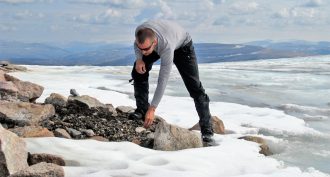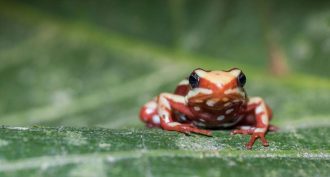Life
-
 Animals
AnimalsHumongous land crab dines on remote-island seabirds
A biologist has documented a coconut crab taking out a seabird as part of a study of the huge invertebrates living on an Indian Ocean archipelago.
-
 Brain
BrainTrading smartphone time for sleep? Your loss
A new study shows more and more teenagers are hanging out on devices when they should be catching ZZZs, putting their health at risk.
-
 Ecosystems
EcosystemsScientists Say: Bog
Bogs are a type of wetland in which partially decayed plants sink down and form peat.
-
 Animals
AnimalsAlligators aren’t just freshwater animals
It’s time to change the textbooks. Alligators have been seen in salty waters snacking on sharks.
-
 Life
LifeDoctors repair skin of boy dying from ‘butterfly’ disease
Researchers fixed a genetic defect, then replaced about 80 percent of a child’s skin. This essentially cured the boy’s life-threatening disease.
-
 Animals
AnimalsLasers can turn a spider’s silk into sculptures
Spider silk is strong and super-stretchy. Scientists have developed a way to sculpt that material into unusual, micro-scale shapes using lasers.
-
 Chemistry
ChemistryScientists Say: Amino Acid
Amino acids are small molecules that make up proteins and serve as messengers in our cells.
-
 Animals
AnimalsTiny T. rex arms were built for combat
The fearsome T. rex had more than a mouth full of killer teeth. Its relatively tiny arms also could have served in close combat as powerful slashers.
-
 Health & Medicine
Health & MedicineScientists Say: Vestigial
This adjective is used to describe something — like a body part or organ — that doesn’t have a function. Often it is smaller or less developed than the functional version in another species.
-
 Environment
EnvironmentTropics may now emit more carbon dioxide than they absorb
Analyses of satellite images suggest that degraded forests now release more carbon than they store.
-
 Climate
ClimateThawing mosses tell a climate change tale
Plants long entombed beneath Canadian ice are now emerging. They’re telling a story of warming unprecedented in the history of human civilization.
-
 Animals
AnimalsHow these poison frogs avoid poisoning themselves
Genetic changes protect poison dart frogs from a toxin, but those changes also cause ripple effects.